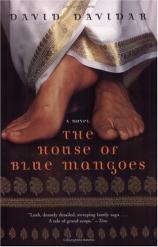About the Book
About the Book
The House of Blue Mangoes

It is hard to imagine a more challenging and complex country for the British Empire to have chosen for colonization than India. To the Western eye, India is a dizzying mosaic of flavors, sights, smells, and sounds. There are hundreds of different dialects and religious figures; thousands of caste and tribal divisions; a variegated geography that boasts tremendous rainstorms, stupefying heat, and impenetrable forests. There are as many ways to make fish biryani as there are women preparing it. And of course there are the infinite varieties of mango.
When we are first introduced to the fictional province of Chevathar, the British occupation of India is firmly established. Western influences have had their way in the country: in its churches and government offices, in the homes and in the minds of the Indian people themselves. But, as the saying goes, the natives are getting restless -- with their colonizers and with each other. In a country whose native faith honors the changing nature of the world, restlessness is a given. But the violence with which India's castes confront one another is devastating. On the eve of the new millennium, India's citizens -- white and native -- regard each other with suspicion, jealousy, and fear.
In The House of Blue Mangoes David Davidar shows us how one family copes with its country's divisiveness as it lurches forward into history. At first, under the guidance of Solomon, the Dorai family seems to have settled into a comfortable compromise between Indian culture and English rule. But Solomon cannot survive the ages-old rivalries that pit one clan against each other. Rather than compromising his own inherited position of power, he dies defending a defenseless cause.
After Solomon's death, the family is torn apart as Aaron becomes involved in a violent campaign for independence and Daniel pursues a career in medicine. Each son, in his own way, will greatly influence his family and his country. Aaron's ascetic devotion to independence transforms him into a criminal and a hero. Daniel's alchemic talent with native plants results in a medicine that convinces Indians that they can look like the English. Each son will die having accomplished much, but mourning the fact that he didn't do enough.
By the time the third generation of Dorai comes to maturity, India's struggle for independence has created a palpable strain on daily life. Daniel's son, Kannan, much to his father's distress, marries an Anglo-Indian woman and leaves Chevathar to help manage an English tea plantation. There he strives to be accepted by English society, even as he knows they regard him as second-rate. When a rash of killings throws suspicion upon Kannan, he resolves to prove his worthiness once and for all. But a harrowing encounter with a man-eating tiger and a disillusioned British officer convince him that he belongs in Chevathar, and he returns to run the family compound his father established in honor of what his father lost.
Davidar concludes his novel with poignant echoes of its opening scenes. Although India, the country, has changed and will continue to change in ways even Kannan cannot imagine, there is much that endures: the force and beauty of nature, the importance of family, and the peace that comes from understanding one's own impermanence. As he welcomes us into the story of the Dorai clan -- and a new day dawning upon a world both glorious and ominous -- so Davidar leaves us with a strong impression of India's contradictory nature: conquerors may come and go; feuds and loyalties may divide and unite; droughts, disease, and misfortune will give way to years of fertility, health, and wealth. But the sun will continue to rise, bringing with it the problems, pleasures, and promise of a new day.
The House of Blue Mangoes
- Publication Date: March 1, 2003
- Genres: Fiction
- Paperback: 432 pages
- Publisher: Harper Perennial
- ISBN-10: 0060936789
- ISBN-13: 9780060936785


